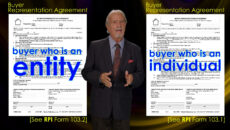Follow these guidelines to keep you and your colleagues safe on the job.
Client interactions
Real estate agents regularly encounter new people and places they are not familiar with – it is the nature of the business. To minimize risk, remember to:
- Limit initial contact with a client. Only agree to meet for the first time at your office or a listed home where the current occupant is present. This ensures your first point of contact is in a safe environment where you are not alone with a prospective client.
- Screen prospective clients. Have them fill out a client profile that collects contact details, and attach a copy of their driver license or identification card. This gives you sufficient information to identify your client and is likely to discourage those with ill intentions. A client profile can also include questions about your client’s sale or home search to help you assess their needs as a seller or homebuyer. At the very minimum, collect basic identification information.
- Use the buddy system. Have someone accompany you to open houses and home showings to reduce the chances of interacting with threatening people or situations. A team member, for instance. Pairing up does not necessarily call for you to partner with another agent – you can bring along a friend, assistant, lender or spouse. Note: any participation by an unlicensed individual is limited as they are not permitted to offer advice or information to your clients. At the very least, make sure at least one person knows where you’re going, and approximately when you’ll be back.
- Don’t lead, follow behind. When showing a home, let the prospective buyer walk ahead to maintain visual control of your surroundings. This is both a safety precaution to protect agents, as well as a reliable method for theft prevention. Bonus: letting your clients walk ahead allows them to view a home at their own pace.
- Always carry your phone and keys. Having an accessible phone on you at all times allows you to quickly and easily contact someone in an emergency. You’ll also want to keep hold of your car keys in case you need to get away from an out-of-control situation.
While implementing these safety measures in practice, remember to trust your gut. Dealing with new clients or prospects requires you to gauge behavior and body language for red flags. If you feel uncomfortable or sense something is off, do not hesitate to act on your instincts. Instinct is your innate security device.
If you feel uneasy around a client or other person you encounter:
- call your office, law enforcement or other person for help;
- have a prewritten text message or distress code ready to send to an emergency contact;
- maintain a safe distance from anyone whose mannerisms indicate potential conflicts;
- come up with an excuse to return to your car or check in with your office; and
- ensure your vehicle is parked in front of a property, not in the driveway, to allow an unobstructed exit.
Further, maintaining professionalism at all times with your appearance and conversation may discourage inappropriate or dangerous behavior from people you meet and assist. Craft your behavior and photos accordingly to set the tone for your interactions with prospective clients or customers. Make sure you:
- highlight your professional aptitude with limited personal information;
- provide only your office phone number and address;
- dress professionally in person and in photos used in advertising;
- forego expensive jewelry and accessories; and
- ensure all marketing material is polished and accurate.
Additional safety measures
Use technology to help trace your location, send alerts to emergency contacts automatically or monitor your physical activity to detect injury. Consider using a GPS tracker on your phone or car, or downloading safety apps to track your activity and contact someone for help.
Related articles:
As a real estate agent, you may further implement safety procedures with your colleagues or employees. To maintain communication with your office, provide your broker or another agent with a schedule listing the homes you are showing and clients you are meeting that day.
Or, leave a copy of your itinerary on top of your office desk, and let others of importance know you do so. If you run into trouble, your office will be able to more easily identify where you are and with whom you are meeting.
Related articles:
For a more immediate form of defense, you may also want to carry pepper spray. As a discreet, small and easy-to-use device, pepper spray is practical for real estate agents to carry and employ in dangerous situations.
Broker implementation
Brokers have the ability to enforce safety standards and procedures for the benefit of their agents. To prioritize personal safety, consider implementing a safety education program. Review safety tips with agents, provide resources and standardize basic procedures to minimize risk.
Your safety plan may include:
- encouraging use of the buddy system as with a team;
- creating a form with a profile template for use with prospective clients;
- enforcing an office-wide distress code for use by agents in emergencies;
- requiring your agents to provide daily itineraries or follow check-in procedures;
- designating an emergency contact or network in the office;
- developing procedures for handling a missing agent or other emergency; and
- helping agents create advertisements that maximize personal safety.
Implementing safety measures in your office creates a secure environment for your agents and helps develop a dependable support system to build camaraderie for use during a crisis.
Further, brokers are encouraged to maintain and update records of an agent’s contact information, license plate number and a copy of their driver license or identification card. Consider creating a schedule for regularly updating agent records. This allows easier identification of information required to keep track of and find sales agents when an emergency arises.
Related articles:
This article was previously posted in 2015, and has been updated.














I suggest taking. Photo of buyer showing them and their car and lic plates
Then email it to a partner or spouse
Roger
As a martial artist of 41 years specializing in women and children self defense, I am shocked that the writer advises agents to carry pepper spray. As with tasers and guns, it will most likely be used as a weapon against you. An agent is far better off wearing a personal alarm that can be easily activate without trying to “take aim” under panic conditions.